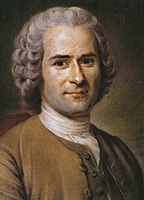
Photo from wikipedia
one themselves; they consequently require the intervention of a lawgiver, a charismatic figure who introduces institutions of self-rule and instills the virtues needed to sustain them. Against the standard reading,… Click to show full abstract
one themselves; they consequently require the intervention of a lawgiver, a charismatic figure who introduces institutions of self-rule and instills the virtues needed to sustain them. Against the standard reading, Tekin represents Rousseau as a sociologically aware thinker who appreciates the difficulty of democratic foundings but helps show us how they may be accomplished. It is often during revolutionary periods, achieved by the people’s own collective action, that the lawgiver makes his appearance, and in these contexts, he functions less as an “architect” than an “interpreter.” He “channels the creative energies of the people, unleashed in revolutionary politics, into the institutional and cultural foundations of a self-legislating political community” (p. 68). A contemporary example is Nelson Mandela, whose rhetoric of democracy, tolerance, and inclusion was vital to the success of the constitutiondrafting process in South Africa. Tekin begins his discussion of Hannah Arendt with a chapter on her Jewish writings of the 1940s, showing that they germinated theoretical claims made famous in her later works. Separating herself from mainstream Zionism, Arendt advocated the formation in Palestine of a Jewish homeland housed in a federal Jewish–Arab republic, which in turn could initiate progress toward a federated structure across the Middle East and Mediterranean region. The goal should not be to assert a preexisting ethnic identity, but to forge a new civic identity through concerted political action. Arendt’s point is that, through a republican act of founding, the people can choose what kind of community they will be. Tekin’s central argument is anchored in his magisterial reading of Arendt’s On Revolution, the work that shows most systematically that democratic foundings are both practically possible and normatively required. The paradox of democratic founding loses its grip when we learn to associate political freedom not with a fictional will of the people but with the experience of mutual promise making and common deliberation among equals. This orientation, if embodied in the founding, can give the resulting structure lasting authority. This is the meaning of Arendt’s association of “beginning and principle, principium and principle” (1990, p. 212). The lesson is that the values we wish to guide our politics should be operative in our founding moments. If we want democratic politics, we should enact our constitution democratically. Tekin finds further support for his argument in Habermas’s theory of deliberative democracy. Constitutional norms derive their authority from the people’s endorsement, but that endorsement must be genuinely inclusive and deliberative, not plebiscitary, in character. Habermas’s theory of communicative freedom spells out the norms of reason giving and mutual justification that make an authoritative political agreement possible, while South Africa’s recent constitution-drafting process illustrates how these principles can be implemented in practice. The consultative process was broadly participatory, guided by principles of mutual respect, and informed by the democratic rhetoric of leaders like Mandela. Founding Acts will provoke any number of responses. One thought I am prompted to offer is that when it comes to drafting a constitution, democratic process and democratic content (how and what) cannot be fully separated. Imagine two constitution-drafting communities—one in which the ratio of theocrats to nontheocrats is 99:1 and the other in which this ratio is reversed. Suppose that in each case the minority is given a voice but is outvoted: the first community adopts a constitution permitting religious coercion, while the second adopts a constitution prohibiting it. These situations are not morally symmetrical. In the first case, the outcome alone proves that the voice of the minority was not adequately represented; in the second case, it proves no such thing. Racial, religious, and sexual minorities will know that they are not genuinely included in the drafting process if their rights are not guaranteed in the resulting document. (This fairly Habermasian thought will, I assume, be congenial to Tekin.) Space does not permit me to mention more than a few of Tekin’s many rich, subtle, and penetrating arguments, nor his insightful engagement with thinkers such as Immanuel Kant, G. W. F. Hegel, Emmanuel Sieyès, Carl Schmitt, Jacques Derrida, William Connolly, Bonnie Honig, Frank Michelman, and Christopher Zurn. Tekin maps the philosophical terrain with a clear eye, summoning contributions from all sides of the debate and shedding light on key puzzles and controversies. His readings of difficult texts are accurate, lucid, and revelatory, and he breaks ground with a powerful new argument about the importance and feasibility of democratic foundings. Founding Acts is a major contribution to our understanding of constitutionalism, democracy, and political legitimacy.
Journal Title: Perspectives on Politics
Year Published: 2017
Link to full text (if available)
Share on Social Media: Sign Up to like & get
recommendations!